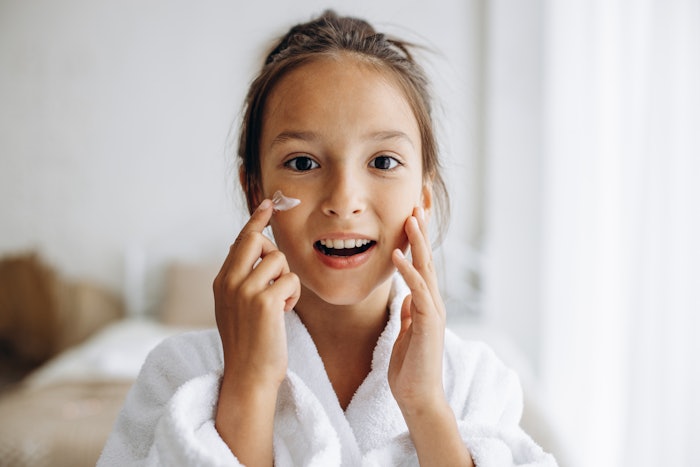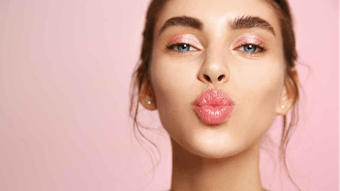
In February 2024, CEW hosted its annual "Global Trend Report" virtual event, featuring data and analyses from Yarden Horwitz of Spate, Larissa Jensen of Circana, Sarah Jindal of Mintel, Sam Mintz of Google, Leslie Ann Hall of Iced Media, Tara James Taylor of NielsenIQ, and Conor Begley and Alex Rawitz of CreatorIQ/Tribe Dynamics. Read our full, multi-part analysis here:
- Beauty 2023-2026: Category Blur & Continued Growth
- Beauty Retail 2024 & Beyond: Shoppers, Inflation & Promotions
- Generation Alpha & Beauty
Every parent’s sense of what habits and behaviors are appropriate and at what age varies from family to family and serves as a perennial debating point on social media and endless think pieces. Beauty is no exception.
This story isn’t going to resolve or even delve into those debates. Instead, we’re looking at the underlying drivers of Generation Alpha’s engagement with beauty.
For the purposes of this discussion, we are talking about children born between 2010 and 2024, with the oldest cohort just now aging into early beauty product engagement.
In her recent CEW briefing, Circana’s Larissa Jensen reported that while prestige beauty spending grew 6% in households without children, it spiked 16% in those with children, signaling emerging engagement among young consumers.
While controversial, the power of “Sephora kids” is undeniable.
During the same CEW briefing, Google data revealed that skin care searches increased in 2023, particularly among Generation Alpha consumers.
There are clear concerns when it comes to kids—particularly girls—engaging with beauty products.
Key worries include usage of products intended for older shoppers, especially products with potentially harsh active ingredients, as well as well-founded issues around unrealistic “beauty” expectations.
Yet a recent NPR report unveiled a less aesthetic reason for using beauty products. One child, “Milly,” said skin care “makes me feel kind of, like, put together and less like ahhh all over the place.”
Another child quoted in the report, “Ana,” shared, “It kind of gives me motivation … [I]t just makes me feel, like, organized.”
Spate data revealed in February, separate from the CEW briefing, noted that TikTok hashtags related to Sephora belie a rise in young consumer engagement: #teenskin, #skincarefortweens and #momtips.
Similarly, high-growth hashtags associated with Ulta include #skincareforkids. Among the retailer’s most popular content is a video focused on a store advisor discussing suitable skin care products for tween girls.
While every family will have its own belief system when it comes to cosmetics, Generation Alpha is charging head-on into the beauty category.
During the CEW beauty briefing, NielsenIQ’s Tara James Taylor noted that the favorite facial moisturizers for kids aged 6-12 include Masque Bar, Byoma, Bubble and Vitamasques.
Top brands for shoppers aged 13-17, per NielsenIQ, include Drunk Elephant, Sol de Janeiro, Glow Recipe and Tree Hut.
Amid rising concerns over children being exposed to adult skin care content on social media, Dove has launched its #TheFaceofTen initiative, encouraging girls to avoid adopting anti-aging skin care far too early.
The brand noted, "Nearly 1 in 2 young girls (10-17 years-old) expect to worry more about their appearance as they age, and 1 in 3 young girls are expected to have cosmetic work or plastic surgery to alter their appearance as they age."
Dove tapped academic experts, dermatologists, creators, body confidence advocates and more on TikTok to spread a message of positivity (and not retinol), led by Drew Barrymore.
In addition, it launched "The Gen A Anti-Aging Talk," on its TikTok, offering expert guidance on how to discuss anti-aging pressures and beauty anxiety with children.
"As a mom to two young girls, it makes me think differently about skin care for younger girls," said Barrymore. "I've spent almost my whole life in a make-up chair, and as a little girl, I loved to play and express myself with things like glitter and stickers–and I would wear make up for expressing myself. However, now there is a huge skin care movement directed at all ages, and some of the products on trend happen to be anti-aging. Not only can that be damaging to young skin, I feel like the message should always be pro age, and age appropriate. I'm so proud to be partnering with Dove to help boost girls' awareness and self-esteem!"
"If young girls feel pressure to use skincare products containing highly active anti-aging ingredients, it could be damaging to their body confidence and self-esteem in the long term, not to mention their skin health," said body image expert Phillippa Diedrichs, Ph.D., BSc. "Today, girls are exposed to adult skin care content online and pressures to look a certain way at a very young age, to the extent that they're adding products designed for adults to their wish lists and skincare regimens, without understanding the possible consequences for their physical and mental health. All of this contributes to a toxic culture of unrealistic beauty standards and pressures."
"When did 10-year-olds start worrying about wrinkles and getting older?" said Firdaous El Honsali, global vice president, Dove. "It is time to speak up to highlight the absurdity and protect their self-esteem. At Dove, we believe beauty should be a source of happiness, not anxiety. For two decades, we have taken action to build confidence and self-esteem for millions of girls. Today, our girls are anti-aging before they've even started to grow up and need us more than ever."










